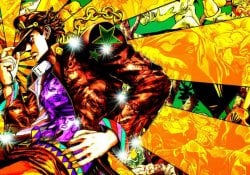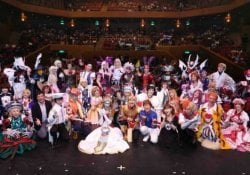In the Japanese language, adjectives can be divided into 2 types, those ending in "i" [い] and those ending in "na" [な]. In this article, we are going to learn some of the Japanese adjectives ending in "i" [い] called keiyoushi.
Japanese adjectives are words that attribute a quality or characteristic to nouns. A. Adjectives of the type [い] have this name because they end with the letter [i].
So whenever you come across a Japanese word that ends with [い] before a noun, it's probably an adjective.
We also recommend reading:
- Adjectives in the form -sa / -sou / -me
- List of Japanese adjectives of the N4 and N5
- SOV Structure – How to Create Sentences in Japanese
![Keiyoushi – Japanese i-type adjectives [い] – list Keiyoushi - Japanese adjectives of type [い] - List](https://skdesu.com/wp-content/uploads/2014/12/adjetivos-nihongo.jpg)
Índice de Conteúdo
Conjugating adjectives ending with i [い]
There are several ways to conjugate adjectives in [い]. One of them is using suffixes like:
- です - Desu is a polite way of ending sentences with adjectives;
- くない - Kunai is a negative way of saying that something is not a given adjective;
- なる - Becoming and Transforming;
- かった - Past;
Form くない - Negative
To conjugate an adjective as negative, just replace the [い] with [くない]. See an example of the negative sentence: It's not cool;
凄くないです Sugokunai desu
Form く- Link with て
The "KU" [く] also serves to link a sentence using the form te [て] as in the sentence: It is red and beautiful;
赤くてきれいです。 akakute kirei desu
We recommend reading: Te (て) - How does this form work in Japanese?
Form -えば - "if" condition
The form "-EBA" [えば] is used to indicate condition, example: if it is red;
赤ければ akakeryay
Form なる - To become
Ending adjectives with “NARU” [なる] (means to become or transform), you can create the following expressions: My room will be bigger;
私の部屋は広くなる watashi no heya wa hirokunaru
Form かった - Past
You can use "KATTA" [かった] which indicates past:
- furukatta ie [古かった家] House that was old;
- sugokatta desu [凄かったです] It was cool;
- sugokunakatta [凄くなかった] It wasn't cool;
There are other forms as well, but we won't go into details so as not to confuse too much. Not to mention that there are many ways of blending the adjective with the verbs. We will leave below some other conjugation forms:
- souda [そうだ] Indicates appear to be. With the exception of ない (なさそう) and よい;
- kattari [かったり] Indicates a momentary situation;
- kunakattari [くなかったり] Negative form of かったり;
- kute [くて] Connection form;
- kunakereba [くなければ] Negative form of ければ;
- sugiru [すぎる] It is equivalent to ''too much'', too much;
- sa [さ] Transforms the ''adjective'' into a ''noun'';
- ki [き] Used poetically;
- me [め] In a way...
- mi [み] Adjectives become verbs with the ending む, such as kanashimu, tanoshimu, kurushimu;
List of Adjectives ending in i [い]
Now let's see a list of adjectives ending in [い] so you can practice and memorize.
Download this Audio, to train speech using the table below: Click Here.
- Abunai [危ない] Dangerous.
- Akai [赤い] Red.
- Akarui [明るい] Bright, illuminated; cheerful person. ⇔ Kurai 暗い
- Amai [甘い] Sweet. ⇔ Nigai 苦い
- Aoi [青い] Blue, green (in case of traffic lights).
- Arai [荒い] Rude (attitude); rough (surface).
- Arigatai [ありがたい] Grateful.
- Asai [浅い] Shallow. ⇔ Fukai 深い
- Atarashii [新しい] Young. ⇔ Furui 古い
- Atatakai [暖かい] Hot, warm. ⇔ Samui 寒い
- Atsui [厚い] Thick. ⇔ Usui 薄い
- Atsui [暑い] Hot (ambient). ⇔ Samui 寒い
- Atsui [熱い] Hot (object). ⇔ Tsumetai 冷たい
- Awatadashii [あわただしい] It is said when you are very busy and don't know what to do.
- Ayashii [怪しい] Which causes distrust.
- Chiisai [小さい] Small. ⇔ Ookii 大きい
- Chikai [近い] Near. ⇔ Tooi 遠い
- Darui [だるい] It is said when the body is without strength.
- Erai [偉い] Important, grand; extreme
- Fukai [深い] Deep. ⇔ Asai 浅い
- Furui [古い] Old. ⇔ Atarashii 新しい
- Fusawashii [相応しい] What suits, what fits, what is due.
- Futoi [太い] Of large diameter; thick. ⇔ Hosoi thin
- Hageshii [激しい] Violent; expresses being more than normal.
- Hanahadashii [はなはだしい] Extreme.
- Hanahanashii [華々しい] Beautiful; grandiose.
- Hayai [早い] Early, fast (time). ⇔ Osoi 遅い
- Hayai [速い] Fast (speed). ⇔ Osoi 遅い
- Hazukashii [恥ずかしい] Embarrassed.
- Hidoi [ひどい] Extreme; excessive.
- Hikui [低い] Low. ⇔ Takai 高い
- Hiroi [広い] Wide, large area. ⇔ Semai 狭い
- Hitoshii [等しい] Equal, equivalent.
- Hoshii [欲しい] have desire.
- Ichijirushii [著しい] Remarkable.
- Ii [いい] Good. ⇔ Warui 悪い
- Isamashii [勇ましい] brave.
- Isogashii [忙しい] Busy.
- Itai [痛い] Sore.
- Iyashii [卑しい] Low, vile, despicable.
- Kagayakashii [輝かしい] Brillant.
- Kanashii [悲しい] Sad. ⇔ Ureshii 嬉しい
- Karai [辛い] Spicy (flavor).
- Karui [軽い] Light; easy ⇔ Omoi Heavy
- Kashikoi [賢い] Clever.
- Katai [かたい] Hard. ⇔ Yawarakai 柔らかい
- Kawaii [かわいい] Cute, honey.
- Kawairashii [かわいらしい] Dear, kind. ⇔ Nikurashii 憎らしい
- Kayui [痒い] What itchy.
- Kemui [煙い] Smoky.
- Kewashii [険しい] Dangerous (place).
- Kibishii [厳しい] Hard.
- Kiiroi [黄色い] Yellow.
- Kimuzukashii [気難しい] Difficult to deal with (person).
- Kitanai [汚い] Dirty. ⇔ 清い
- Kitsui [きつい] Heavy (work, attitude).
- Kiyoi [清い] Clear. ⇔ Kitanai 汚い
- Koi [濃い] Thick (liquid). ⇔ Usui 薄い
- Koishii [恋しい] Missing.
- Kokoroyoi [快い] Nice.
- Komakai [細かい] Detailed; small.
- Konomashii [好ましい] Preferable.
- Kowai [怖い] That gives (has) fear.
- Kudoi [くどい] Impertinent person; past (flavor).
- Kurai [暗い] Dark (environment). ⇔ Akarui 明るい
- Kuroi [黒い] Black color.
- Kurushii [苦しい] Which causes suffering.
- Kusai [臭い] Unpleasant odor.
- Kusuguttai [くすぐったい] Which is ticklish.
- Kuwashii [詳しい] Detailed; person with deep knowledge on the subject.
- Kuyashii [悔しい] Feeling of regret for not having made it.
- Mabushii [眩しい] blinding.
- Magirawashii [紛らわしい] That deceives, ambiguous, that leaves in doubt.
- Marui [丸い] Round in shape.
- Mazui [まずい] Poorly done; bad taste. ⇔ Delicious, tasty
- Mazushii [貧しい] Poor.
- Medetai [めでたい] Willingness to celebrate.
- Mezurashii [珍しい] Rare.
- Migurushii [見苦しい] That causes suffering to look at.
- Mijikai [短い] Short. ⇔ Nagai 長い
- Minikui [醜い] Ugly. ⇔ Utsukushii 美しい
- Misuboroshii [みすぼらしい] That looks like poverty.
- Mittomonai [みっともない] Shameful.
- Monosugoi [物凄い] Amazing awesome.
- Moroi [もろい] Fragile, easy to break.
- Munashii [空しい] Empty.
- Muzukashii [難しい] Difficult. ⇔ Yasashii 易しい
- Nagai [長い] Far away. ⇔ Mijikai 短い
- Nai [無い] That does not have.
- Namanamashii [生々しい] New; vivid.
- Natsukashii [懐かしい] What I miss.
- Nemui [眠い] Sleepy.
- Nibui [鈍い] Slow-response (movement), obtuse (object). ⇔ Surudoi 鋭い
- Nigai [苦い] Bitter. ⇔ Love 甘い
- Nikui [憎い] hateful.
- Nikurashii [憎らしい] hateful. ⇔ かわいらしい
- Noroi [のろい] Sluggish.
- Nurui [ぬるい] Warm (liquid).
- Oishii [おいしい] Delicious. ⇔ まずい
- Okashii [おかしい] Strange; funny.
- Omedetai [おめでたい] Polite form of めでたい.
- Omoi [重い] Heavy. ⇔ Karui 軽い
- Omoshiroi [おもしろい] Interesting; funny. ⇔ Uninteresting
- Ooi [多い] Numerous. ⇔ Sukunai 少ない
- Ookii [大きい] Great. ⇔ Chiisai 小さい
- Osanai [幼い] Childish.
- Oshii [惜しい] Feeling of pity, waste.
- Osoi [遅い] Slow; late. ⇔ Fast
- Osoroshii [恐ろしい] Scary, terrifying.
- Otonashii [おとなしい] Calm, docile.
- Sabi(mi)shii [寂しい] Feeling of loneliness.
- Samui [寒い] Cold (ambient). ⇔ Atsui 暑い, Atatakai 暖かい
- Sawagashii [騒がしい] Noisy.
- Semai [狭い] Narrow. ⇔ Hiroi 広い
- Shibui [渋い] Astringent flavor; grumpy.
- Shiroi [白い] White (color).
- Shitashii [親しい] Intimate.
- Shitsukoi [しつこい] Naughty, boring.
- Sosokkashii [そそっかしい] careless
- Sôzôshii [騒々しい] Noisy.
- Subarashii [素晴らしい] Amazing.
- Sugasugashii [すがすがしい] Refreshing.
- Sugoi [すごい] Incredible, impressive, too much.
- Sukunai [少ない] Little numerous. ⇔ Ooi 多い
- Suppai [酸っぱい] Sour taste.
- Surudoi [鋭い] Perspicaz (person); pontiagudo (object). ⇔ Dull
- Susamajii [すさまじい] Impressive.
- Suzushii [涼しい] Fresh (time).
- Tadashii [正しい] Correct.
- Takai [高い] High (object, price). ⇔ Hikui 低い
- Takumashii [逞しい] Strong, robust.
- Tanomoshii [頼もしい] What can you trust, what can you count on.
- Tanoshii [楽しい] Funny. ⇔ つまらない
- Tayasui [たやすい] Easy.
- Toboshii [乏しい] Poor, scarce.
- Tooi [遠い] Far away, far away. ⇔ Chikai 近い
- Tsumaranai [つまらない] Boring, uninteresting. ⇔ おもしろい, Tanoshii 楽しい
- Tsumetai [冷たい] Cold, icy (things). ⇔ Atsui 熱い, Atatakai 暖かい
- Tsurai [辛い] Hard, painful.
- Tsuyoi [強い] Strong. ⇔ Yowai 弱い
- Umai [うまい] Well done; tasty. ⇔ まずい
- Urameshii [恨めしい] That makes us feel pity, anger.
- Urayamashii [うらやましい] Enviable.
- Ureshii [嬉しい] Happy. ⇔ Kanashii 悲しい
- Urusai [うるさい] Noisy.
- Usugurai [薄暗い] Somewhat dark (environment).
- Usui [薄い] Fino (condensation); light color. ⇔ Koi 濃い
- Utagawashii [疑わしい] Which brings distrust.
- Utoi [疎い] little known, little intimate.
- Utsukushii [美しい] Beautiful. ⇔ Minikui 醜い
- Uttôshii [うっとうしい] Dark, obscure.
- Wakai [若い] New (time, age).
- Warui [悪い] Bad. ⇔ Yoi 良い
- Wazurawashii [煩わしい] Noisy.
- Yabai [やばい] Dangerous; expresses a not good situation.
- Yakamashii [やかましい] Noisy; demanding; strict.
- Yasashii [優しい] Gentle, docile character.
- Yasashii [ ] Easy. ⇔ Muzukashii 難しい
- Yasui [安い] Cheap. ⇔ Takai 高い
- Yawarakai [柔らかい] Soft. ⇔ かたい
- Yoi [良い] Good. ⇔ Warui 悪い
- Yoroshii [よろしい] Polite form of 良い.
- Yowai [弱い] Weak. ⇔ Tsuyoi 強い
- Yurui [緩い] Loose (things).
- Zurui [ずるい] Smart, asshole.
- Zûzûshii [ずうずうしい] Shameless.
Videos about adjectives i [い] in Japanese
To finish, let's share some videos for you to study. I hope you enjoyed this little article... If you liked it, share our list of adjectives ending in i [い] with your friends.





